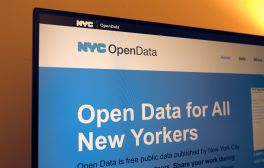Analyze Boston cranks up civic engagement on open data

A beta version of Boston’s new open data platform released Tuesday unifies and organizes the city’s previously scattered data collection.
The new portal — called Analyze Boston — pulls together data sets from the city’s map showcase and tabular data stores, organizes the data into topics like public safety or transportation, implements a consistent public domain license across all city data, tags data sets that are no longer maintained with a “legacy portal” tag and uses an open source CKAN service managed by OpenGov.
OpenGov CEO Zac Bookman said the platform will allow elected officials and residents “to more effectively understand key trends, make informed decisions, and build trust that is essential to the city’s health and wellness.”
With a visual style and iterative development approach that matches the city’s main web presence, represents a step forward in government transparency and continues a trend of increased citizen engagement.
Launched as part of Mayor Marty Walsh’s Open Data to Open Knowledge initiative funded through the Knight Foundation, the new portal is part of the city’s effort to “democratize” access to city data through direct collaboration with the community and librarians. Indeed, said open data project manager Howard Lim, the city is working with the community to ensure the tools it builds actually serve the community.
“Open data is extremely important to the administration,” Lim said. “I think data generally is something that Mayor Walsh has put a very strong emphasis on and I think this effort here is trying to make the data accessible as broadly as possible to the public.”
Notable features of the new portal include a showcase section that highlights projects that have been completed using Boston’s open data. The city doesn’t have the bandwidth do all the analyses and projects it wants to on its own, noted Andrew Therriault, Boston’s chief data officer.
“This is partially because we are trying to encourage people to build things with this data,” he said. “So not only do we want to provide information so people can understand what’s going on in the neighborhoods around them, but also we’re trying to make it more useful for people to do analyses, build out applications and tools, find their own creative ways to use it.”
Boston’s new data portal has new features — like the ability to log in, track specific data sets, view data set change logs, and have discussions about data sets — but the interesting trend is a more “substantive” approach to open data and civic engagement generally, said Stephen Larrick, open data project lead for the Sunlight Foundation.
“Increasingly, we’re seeing cities do more than just put the data out there, but to take a new more expansive approach to it,” Larrick said, noting that the city’s move to use open licensing on all of its data sets was an important change away from the “somewhat restrictive” language found in Boston’s past licenses. “I think the last thing you want when you’re encouraging people to use your data is for someone to think, ‘Am I allowed to use this?'”
Boston’s open data policy, published in 2015, encourages the use of open licenses, but until the recent update, some of the city’s licenses used language that might have scared off a business owner, developer or researcher who wanted to use the data.
“I hate to sound like I’m just singing the city’s praises here,” Larrick said, but added that “this is on the cutting-edge of what we’re seeing cities do.”
For those still adjusting to the new design, the city will maintain the old open data portal until the end of the summer when will be permanently replaced by the new design.
Editor’s Note: This story was updated on March 1, 2017 to include a comment from OpenGov.





